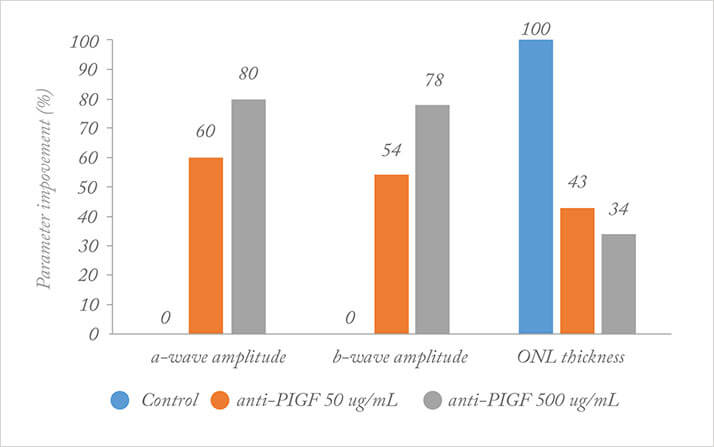
Dry age-related macular degeneration (AMD), unlike its neovascular cousin, has no effective therapies available today – bad news, especially as it comprises about 85 percent of AMD (1). To address this gap, researchers are focusing on the identification and verification of new treatment modalities in the lab. Recently, a group at Gifu Pharmaceutical University, Japan, observed a protective effect of placental growth factor (PlGF), a member of the vascular endothelial growth factor (VEGF) family, on a model of retinal neuronal damage in vitro (1). Seeing an opportunity to tackle dry AMD, the researchers opted to test this effect in a living mouse model (2).
Dark-adapted mice were injected intravitreally with 5 or 50 pg of PlGF-2 (the mouse isoform of the growth factor), either two hours before light exposure or immediately after. But electroretinograph and histological analyses revealed that, regardless of dose, PlGF was actually exacerbating light-induced retinal damage, reducing a- and b-wave amplitudes (indicative of photoreceptor and neuron function, respectively) and decreasing the thickness of the outer nuclear layer. So the researchers changed tack, deciding instead to evaluate the validity of anti-PlGF agents. To do so, they administered either 0.1 or 1 μg of anti-PlGF-2 antibody into each eye of the mouse, which resulted in a partial protective effect against a- and b-wave amplitude reduction (an improvement of 60 percent with the lower dose and 80 percent with the higher), significant suppression of outer nuclear layer thinning (reductions of 57 and 66 percent, respectively), and improved cell-cell junctional integrity.
The results came as a nice surprise, as a drug that inhibits PlGF is already available for intravitreal use: aflibercept. Although aflibercept has not been clinically evaluated for the treatment of dry AMD, the study’s authors believe that “there is a very great likelihood that aflibercept will show efficacy in dry AMD.”
References
- Y Inoue et al., “Protective effects of placental growth factor on retinal neuronal cell damage”, J Neurosci Res, 92, 329–337 (2014). PMID: 24293397. H Izawa et al., “Protective effects of antiplacental growth factor antibody against light-induced retinal damage in mice”, Invest Ophthalmol Vis Sci, 56, 6914–6924 (2015). PMID: 26513607.
